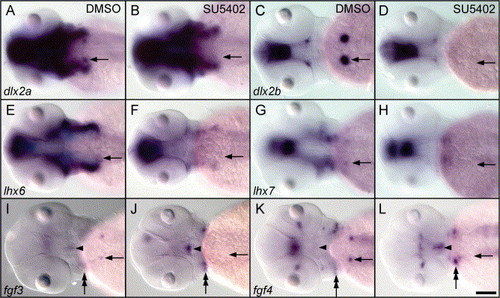Fig. 7
- ID
- ZDB-FIG-050304-5
- Publication
- Jackman et al., 2004 - Fgf signaling is required for zebrafish tooth development
- Other Figures
- All Figure Page
- Back to All Figure Page
|
Dlx, Fgf, and Lhx tooth-related gene expression is inhibited by SU5402 treatment. Dorsal views of 56 h in situ hybridizations, focused at the level of the pharynx, anterior to the left. Embryos were treated with 0.5% DMSO (columns A and C) or DMSO+ 25 μM SU5402 (cols. B and D) from 32 to 56 h. The location of the left side tooth germ is indicated by an arrow in all panels. Tooth germ expression of dlx2a, dlx2b, lhx6, lhx7, fgf3, and fgf4 is present in DMSO controls, but absent in SU5402-treated specimens. (I–L) fgf3 and fgf4 expression in the ventral diencephalon (arrowheads) and in the anterior pharyngeal pouches (double arrows) appears stronger in Su5402-treated specimens (J and L). Scale bar = 100 μM. |
| Genes: | |
|---|---|
| Fish: | |
| Condition: | |
| Anatomical Term: | |
| Stage: | Long-pec |
Reprinted from Developmental Biology, 274(1), Jackman, W.R., Draper, B.W., and Stock, D.W., Fgf signaling is required for zebrafish tooth development, 139-157, Copyright (2004) with permission from Elsevier. Full text @ Dev. Biol.

